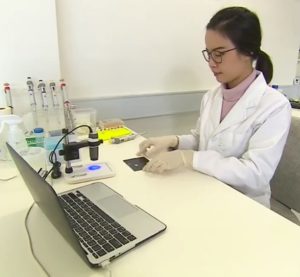 Piyamas Kanokwongnuwut from the College of Science and Engineering is one of the seven winners of the Best HDR Student Publication Award for 2019.
Piyamas Kanokwongnuwut from the College of Science and Engineering is one of the seven winners of the Best HDR Student Publication Award for 2019.
Her winning publication, ‘Shedding light on shedders’ shows for the first time, that we can see ‘touch DNA’ transferred to a surface using a special, field-deployable, fluorescence microscope. This allows crime scene examiners to focus their evidence collection efforts rather than sample evidence ‘blindly’. More importantly, it proves that some people do indeed pass on more DNA than others when they hold something. The amount of ‘touch DNA’ left on a surface varies from person to person and this is known as a ‘shedder’ status. Using this approach has allowed Piyamas to determine, very rapidly and accurately whether an individual is a shedder. This ground-breaking work has since lead to a world-wide acclaim and use.
Piyamas had been fascinated by forensic science research since she was studying Plant Science (M.Sc.) at Mahidol University in Thailand. She had previously developed a novel method to detect trace DNA of cannabis. This integrated the disciplines of plant science and forensic science nicely and showed Piyamas where her interest lied. “The study I previously conducted had a practical impact and improved investigation into cannabis. Since then I concluded that studying forensic science was very rewarding and I found my passion. The forensic science was the key reason for me to commence PhD studies. I wanted to follow my passion and to live a fulfilling life.” – Piyamas says.
Piyamas would like to acknowledge her MSc supervisor, Assistant Professor Nathinee Panvisavas. She says “After an extensive discussion we both had about my PhD goals, Assistant Professor Panvisavas advised that I should do my PhD with Professor Adrian Linacre. This suggestion was priceless as Professor Linacre is a very intelligent forensic biologist. My associate supervisor is Professor Paul Kirkbride. He is a knowledgeable chemist and brings a lot of interesting concepts that I would not have access to without his input. Both my supervisors have lots of experience in case work investigations and have been teaching for decades. I have acquired and learned so much from them and would like to express my appreciation to them.”
When asked about a piece of advice she would give for current or prospective PhD students, Piyamas says: “Keep doing what you are doing! There will be long days and lots of self-discipline is required, but all the efforts you put in to your studies will pay off one day. It might be hard sometimes, but it is worth it. Give yourself suitable breaks and find a hobby that is relaxing and takes your mind off your work.”
Piyamas is proud of her publication as it facilitates the simple introduction of the techniques and concepts into both, the forensic and the research laboratory workflows. It allows laboratories to simply test the shedder status of their DNA donors and increases the relevance of their data and the strength of any conclusions made from their data sets. “I am honoured to be a part of this intelligent, talented and strong research group. This team is a leader in the international forensic science community and undertakes ground-breaking studies; the ramifications of their work are immense in the field.”
Winning the award gives Piyamas recognition, and her publication an increased visibility to both the forensic and non-forensic communities. “Personally, it confirms that I am on the right track in the field, where I would like to grow my profile internationally. It shows that what I have been doing is paying off. I have experienced lots of support from my friends, PhD colleagues and supervisors. I am grateful to be surrounded by all of them during my PhD journey.”
Piyamas hopes that all her studies and works have practical applications and therefore help people and improve the world. “I have received a great opportunity from a DPST (Royal Government of Thai Scholarship) to complete my PhD studies overseas. I really want to be a part of the development and improvement stream of the Forensic Science in Thailand and take them to an international level. I believe that the knowledge and skills I have attained from Flinders University can be integrated in practical terms and will be useful for my country.”
To view Piyamas Kanokwongnuwut’s full publication, click here.

